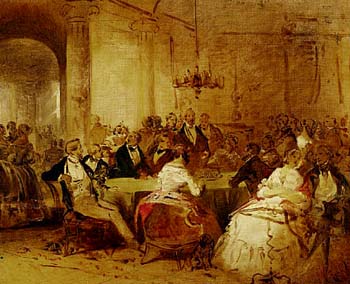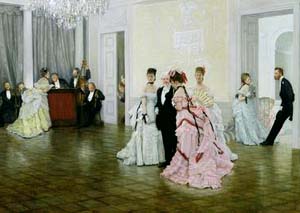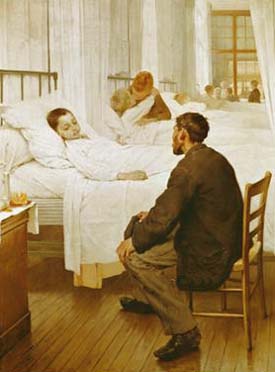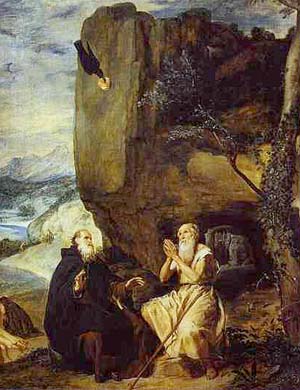 |
Formation of Children
Proper Behavior for Visits - Part II
Marian T. Horvat, Ph.D.
In friendships, a man should maintain the right to have his opinions and maintain his personal independence. It is natural to expose your thoughts and the reasons for your way of thinking. Your character should manifest itself in every action of life. Not even the bonds of friendship demand forced neutrality on important topics and abdication of personality.

At social gatherings, the man who knows how to converse is always welcome |
The most slippery or treacherous ground in conversation is the religious or political discussion. At social gatherings, one should not head in that direction without good reason. In those cases when the topic is raised, it is normal to affirm your convictions, being aware that probably no one will change his political opinion or religious belief because of the discussion.
A discussion on religion, however, can be the way that divine providence desires to work to convert persons to the Catholic Faith. For this reason, a youth should become familiar with the main principles of Catholic doctrine appropriate for the present day needs. A person should never speak about what he does not know. Nor should he approve what he does not understand or what seems wrong.
When to end a visit
In general, the duration of visit should not exceed 20 minutes, except if it is among relatives or close friends. The person who knows how to end a visit at a convenient moment before his presence becomes inopportune is appreciated as pleasant company.
Upon leaving, the visitor should rise, say some amiable words, and retire without haste. If the gathering is small, he should express his thanks to the host and hostess, making a slight bow. At many gatherings, above all at larger parties, it is permitted to retire without taking leave of the host and hostess, unless they are particularly sensitive to the testimony of that deference. It would be taken as rude to leave at the exact moment that other visitors enter. It is convenient to remain several minutes with them before taking one’s leave.
After announcing his intention to leave, the guest should do so. The long drawn-out exit is tiresome for both the host and other visitors.
Conversation
If a man is speaking about his wife, a family member or friend in the presence of those who do not know them, he should not omit the convenient qualification. For example, he would say “My wife Louise …” If the company knows her, he should simply refer to her as Louise. He should never refer to his wife as “Mrs. X.”
A well-mannered man will try to be amiable when conversing with others, expressing real interest in them and steering them toward conversations on themes that are agreeable to them.

Arriving too early at a formal party may find you waiting in the hall for the event to open - Painting by J. J. Tissot |
No one should dominate the conversation, try to direct or close a discussion, pronounce judgments in an authoritarian tone, or attempt to sparkle like a star on stage. Young men should take care not to fall into such faults, which reveal a thin veneer of culture and little skill in communicating with one’s fellow man.
Respect for the feelings of others, prudence, and Catholic charity oblige us to an extreme reserve in choosing our words. The courteous man says nothing without thinking first, nor does he say everything that he is thinking. Imprudence in this matter can be fatal to a friendship. Haste in speaking can cause profound humiliations.
Here are several true stories to illustrate the point. The reader can certainly add his own anecdotes involving irreparable social gaffes made by speakers who did not weigh their words.
During a large gathering, one military man asked another, “Since you’re in the Fourth Division, surely you know Colonel X?”
The new acquaintance replied: “I know him very well. As proof, I can attest he is a perfect brute to those he commands.”
The first officer responded, somewhat coldly, “He’s my brother.”
This is the result of speaking without thinking …
At a dance given in a private home, a young man approached another man who was standing idly by, looking somewhat bored. He said to him, “I’m sick and tired of this boring party. I’m leaving now. Do you want to come with me?”
The man answered, “You have my permission to go. I’m the owner of this house.”
It is doubtful our young artless fellow received another invitation to that house.
At a debutante party, one young man asked another gentleman in dress uniform, “Who is that lady over there in the cream-colored dress with the moon face?”
“It’s my wife.”
“You misunderstood me,” said the unfortunate youth, his face red with shame, “I wanted to say that lady in blue, near the one in cream.”
“Oh, that’s my sister,” the man replied.
The list of incidents like this has no end.
Social obligations and business visits
Even when they are tiresome, when they are not motivated by friendship, visits are a social obligation. They favor peace and harmony among men. They embellish life; they dispel loneliness; they give comfort in sorrow. They elevate ways of being; they perfect customs; they create urbanity.
In small towns or rural areas, visits are more familiar, losing the more ceremonious tone of the great cities, and can be longer. Then the visitor is always invited to take an indispensable coffee or tea.
Visits that businessmen make in seeking clientele obey the various rules of the area. The result of his proposals frequently bears a direct relation to the way he presents himself and his products. He should expose his topic with clarity and brevity, without fastidious digressions or tiring the listener with long spiels or tall tales. He should be quick to listen without interrupting the responses of the one he addresses. If his proposal is unsuccessful, he should take his leave amiably, thus leaving with the hope of receiving a more favorable response at another opportunity.
This polite behavior leaves a good impression on the one who has given his time to hear the proposal. He will privately praise the courtesy of the salesman and will not resent having given his time, and will be more disposed to receive him again sometime in the future.
The courteous host and guest

The hospital visit is an act of charity and lifts the spirits of the sick |
When a person is a guest in our home for some time, he has the right to a special treatment. The guest, says the proverb, is the blessing of God.
Without having given advance notice or having been invited, a person should not present himself to receive lodging at the house of a friend. It is very arrogant, crackling with incivility and impertinence, to invite oneself to the house of another unless there are serious and obvious reasons for doing so, based on a long-standing friendship or close family relation.
Cordiality and discretion summarize the code of duties of the one who receives as well as the one who is received. To invite someone is to assure his well-being for the time that he passes under your roof. Therefore, whoever receives a guest should show him every attention. On the other hand, the one invited should accept such attentions with a certain reserve, taking care not to abuse the hospitality of his host.
The host should make every attempt to meet his guest at the airport or station. The room and bath facilities should be ready and very clean. The host should take care to show the guest the general layout of the house, his bed, bathroom, drinking water, lights, and other amenities, as well as inform him the time for meals and the general schedule of the house. He should not let the guest know if his presence is causing some member of the family an inconvenience or upsetting the house schedule.
The host should allow the guest the comfort of some hours alone each day, to go out for a walk or remain in his room, depending on the quarters of the house. For certain persons, solitude for special private occupations – reading, letter-writing, prayers, etc. - constitutes a necessity in his way of life.
The guest should show himself satisfied with everything that is done for him. He should avoid complaining or looking vexed, even if he lacks something. The cultured guest does not involve himself in the affairs of the household; he closes his ears and eyes to the less edifying things he may see or hear. It is a complete lack of gratitude to criticize his host’s household and affairs to others.
The polite guest does not take too literally the warm invitation to “treat my house as if it were your own,” but is careful to respect the customs of the household. The guest should take breakfast following the schedule of the house. He should avoid rising either too early or too late, smoking in the rooms, coming in very late at night, leaving his bed unmade and the room disordered, and so on.
The considerate guest will leave on the pre-determined day despite any insistence made to keep him. Such insistences are a courtesy to which one responds with another courtesy. On the day of departure, it is appropriate to offer an unpretentious gift to the lady of the house or the children to express gratitude for the hospitality and the attentions given. Some days after leaving, the guest will remember to send a letter thanking those who treated him as a member of the family.
St. Anthony’s visit to St. Paul the Hermit
Note how the hermit St. Paul received the visit of St. Anthony.
Both were living in Egypt. Paul was 113-years-old and had been living alone in a cave in the desert for 60 years. Anthony, age 90, was living in a monastery in the desert and thought that he was the oldest hermit in the world.
In order to correct this beginning of vanity, God revealed to St. Anthony the existence of a man who was older and holier than he, and ordered him to seek Paul out and visit him. Anthony put his confidence in God, set out in the desert, and walked for two days and two nights until Providence led him to the cell of Paul.

A crow brings a whole loaf of bread to St. Paul and St. Anthony |
The latter, seeing himself discovered, closed himself in his cave. Anthony did not leave, but prayed until the hermit decided to appear. After a long wait, the door opened. Paul came out and the two saints embraced. Despite the fact they had never seen each other, they addressed each other by name.
“You have found the one you have sought, my brother,” Paul told Anthony. “You are seeing a man who in a short time will be dust and ashes.” Then he asked his guest questions about the persecution of the Christians and the state of things in the world, to which Anthony responded as best he could.
While they spoke, a crow came and brought a whole loaf of bread. Seeing this, Paul, filled with admiration, exclaimed, “See how good and merciful God is, sending us this food. For the 60 years I have been here, daily I have received a half loaf of bread. Because of your visit, today God sends us a whole loaf.”
The two saints thanked Divine Providence and passed the rest of the day and night in pious colloquy and prayer.
The next morning, Paul said to his companion, “For some time I have known that you lived in this vicinity. Since I am at the end of my life, God has sent you here to bury my body.”
Saddened to hear this, Anthony begged the holy hermit that he take him with him to Heaven.
“This is not the will of God,” responded Paul. “You must continue on this earth for some time in order to direct the religious in your monastery. Now, go and return with the mantle that you received from St. Athanasius so that you can wrap my dead body in it.”
He made this request to prevent Anthony from witnessing his death, as well as to show his great respect for the intrepid Bishop Athanasius.
When Anthony returned to the religious of his monastery, he told them, “Woe to me, poor sinner that I am! I do not deserve the name of religious. I have seen Elias, I have seen St. John Baptist in the desert. I have seen Paul in paradise.”
Taking the mantle of Athanasius, he hurried back to the cave. On the road he caught sight of the soul of the saint surrounded by light rising up to Heaven in the company of the Angels, Prophets and Apostles.
Upon entering the cave, he found Paul on his knees, immovable, his arms stretched out in a cross, and his head turned toward Heaven. He seemed to be praying, but he was no longer living.
Anthony wrapped the body in the mantle of St. Athanasius. To help dig the grave, two lions came out of the neighboring forest, stopped before the cadaver and then dug a hole in the sand sufficient to bury the body. Anthony prayed over the dead body and buried it. Before returning to his monastery, Anthony took Paul’s tunic made of palm leaves. For him it was a precious relic that he wore on great feast days.

Posted February 7, 2008


Related Topics of Interest
 Introduction to the Small Manual of Civility Introduction to the Small Manual of Civility
 Chapter 15: Amiability Chapter 15: Amiability
 Chapter 16: The Braggart Chapter 16: The Braggart
 Chapter 17: The Value of Distinction Chapter 17: The Value of Distinction
 Chapter 18: Let's Not Forget the Greeting Chapter 18: Let's Not Forget the Greeting
 Chapter 19: The Blessing Chapter 19: The Blessing
 Chapter 20: The Family Milieu Chapter 20: The Family Milieu
 Chapter 21: A Youth's Relations with His Superiors Chapter 21: A Youth's Relations with His Superiors
 Proper Behavior for Visits - Part I Proper Behavior for Visits - Part I

Related Works of Interest
|
|
Formation | Cultural | Home | Books | CDs | Search | Contact Us | Donate

© 2002- Tradition in Action, Inc. All Rights Reserved
|
 |
|